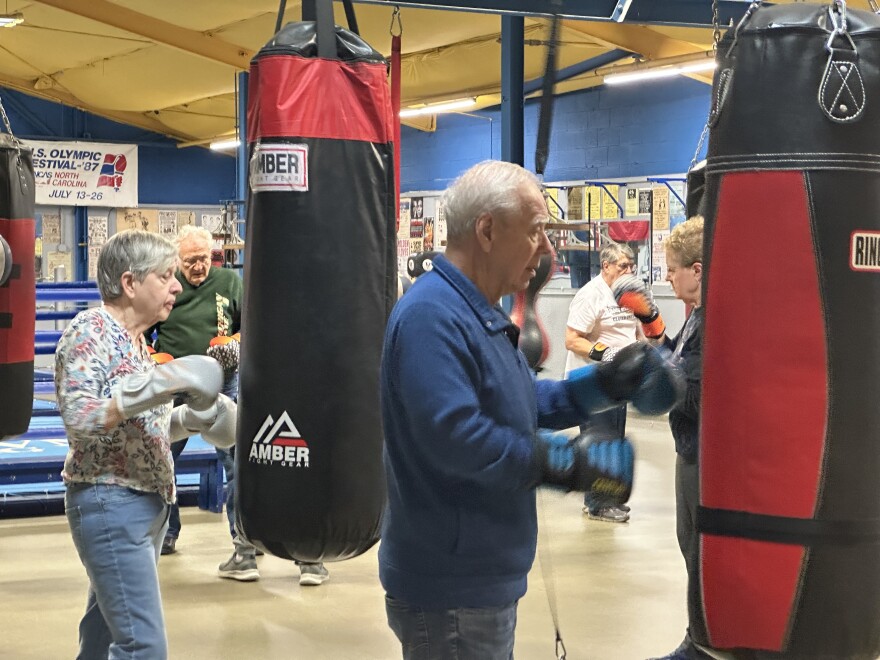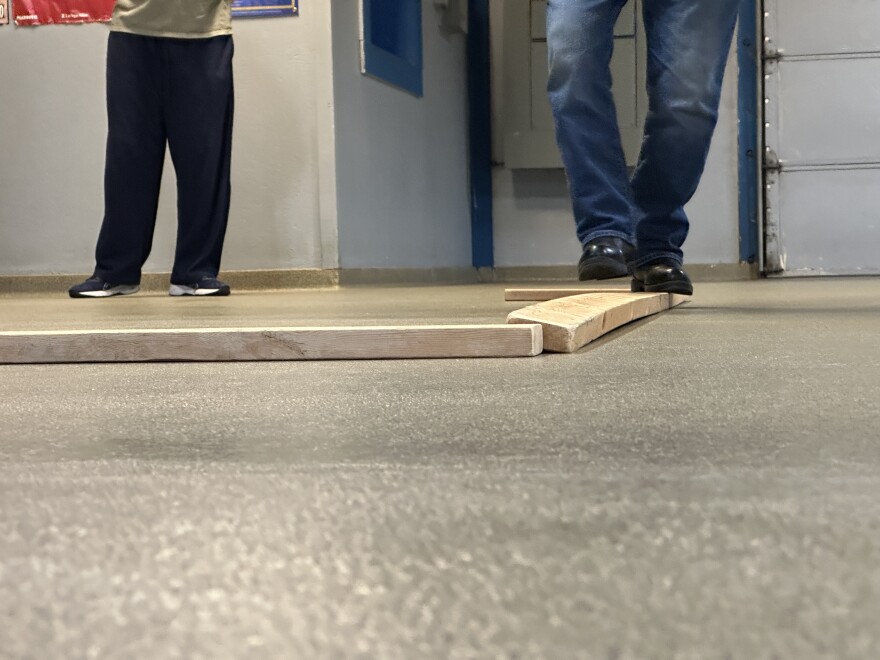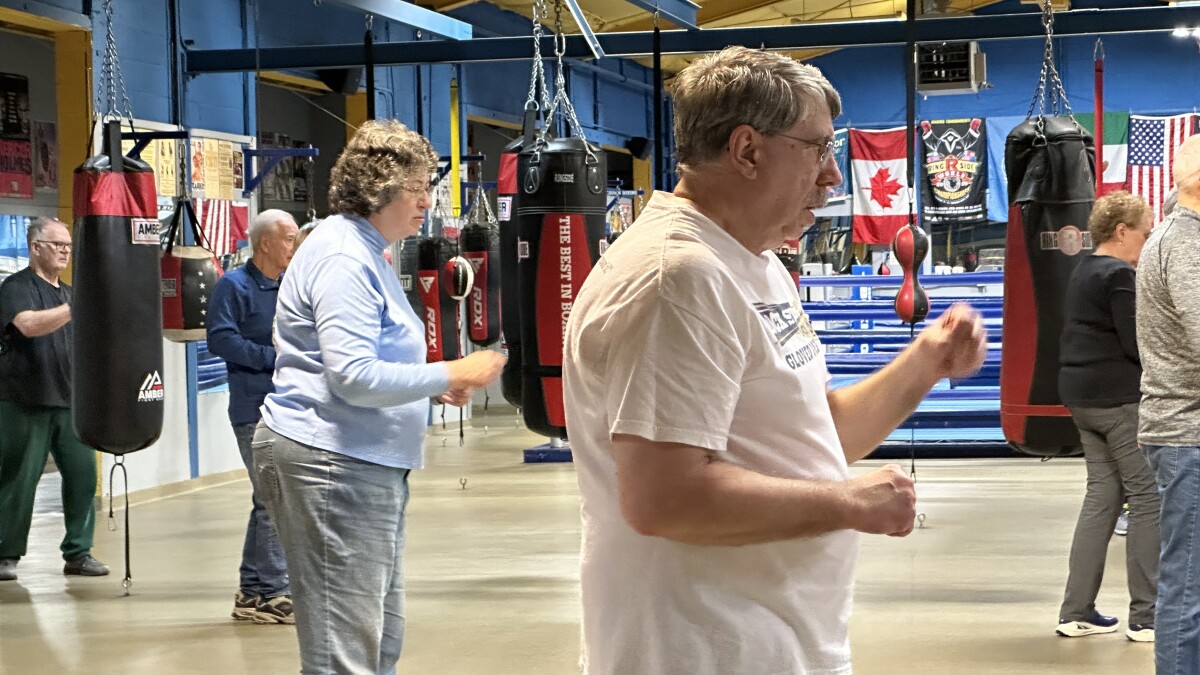Ted Zale’s Uncle Tony wasn’t Superman, though he was nearly as invincible. Tony’s two NYSAC and NBA middleweight boxing titles and a 67-18-2 record in the 1940s earned him the nickname “Gary’s (Indiana) Man of Steel.”
Fighting has always been in the Zale family, and Ted has always been inspired by his uncle.
“As soon as they found out I was a Zale, I was in a fight,” Zale said. “So I learned to fight early. When I was five or six years old I had my nose broken in the ring by my older brother.”
Tony was a real superhero to Ted, and he cared for him until he died of Parkinson’s disease in 1997.
That inspiration and taking care of his uncle through his stages of the incurable neurodegenerative disease led Ted to Lansing’s Crown Boxing every Tuesday and Thursday morning to step into the ring with his son, Patrick, and a different group of boxers.
Namely, group of boxers fighting Parkinson’s disease.

Ethan Hunter
Ted runs the Lansing chapter of Rock Steady Boxing, a program designed in 2006 by a 40-year-old man in Indianapolis after his early diagnosis. Ted designs exercises and boxing drills to work the muscles and brains affected by Parkinson’s.
“The neural agents and nerves have been damaged by the disease. So what we do is by making them work, make mistakes, that actually ties those back together. Like Dave, one of our first guys, it gave him the opportunity to drive with it,” Zale said.
Ted started the group in 2017, and has seen more than 50 participants come through the program since. This session, the group starts their session by walking the plank. Ted sets three wood planks on the gym floor in a “U” shape.
The plank is probably not a technique practiced by Joe Louis or Mike Tyson, but the boxers’ eyes fixate on the 2x4s like it’s the World Championship belt.
Steve Robinson, 68, walks up first. Someone from the line shouts out that he likes to show off. He proves this by walking the full plank, foot over foot carefully, then prancing backwards, all the way to the start. It’s met with thunderous applause.

Ethan Hunter
Robinson’s speech is affected by Parkinson’s and he has a tremor, but his balance is still good. He was diagnosed in 2017 and was also in the first group of participants. Just like everyone else, he has ups and downs.
“I used to be able to walk the plank perfectly. Now, sometimes I can’t,” Robinson said. “It just depends on the day. Some days are good. Sometimes you’re not good.”
This session seems like a very good day.
As the class continues, some fall off the boards. But when they do, they never just walk to the back of the line. It’s always get right back on and keep going. No matter how many times someone has to get back on, encouragement and applause meets everyone on the other side.
The next portion of class, shadow boxing, is led by Steve. He calls out moves – left hook, right jab, right uppercut, face the wall – and the class follows.
Jim Heyden is in the back, practicing the movements. He’s very steady.
“I’m 86 and the only reason I’m here is because I’m old. I don’t have Parkinson’s. I’m just here for my balance and stuff like that,” Heyden said.
He didn’t start coming ‘just because he’s old.’ Heyden started driving his best friend from high school , Ray Lincolnhol, to Crown Boxing twice a week and decided to jump in with him. Lincolnhol was diagnosed with Parkinson’s and dementia, and passed away in Nov. 2023, but Heyden still hasn’t missed a day.
“My theory is – it is what it is. It’s been a good life. I was very fortunate because I got Guillain-Barré, and a lot of people are paralyzed permanently but I’ve recovered from that. I’ve been blessed – really,” he said.
Heyden retired as the Deputy Chief of the Lansing Police Department 31 years ago. He recently took his family to Australia, where he walked all 3,770 feet of the Sydney Harbor Bridge for his birthday. He can’t run six miles to work every day like he used to, but keeping active is key for him.
The class moves to the heavy bags, stringing combos together on their own. Keeping active is a theme for all the boxers and it’s the key component of the program. Mike Hudson, 79, had a mini-stroke less than a month ago, but is on his second class back for that reason. He said you can’t stop moving.
“I had a twin brother, and he had parkinsons but he didn’t do any of this. He was diagnosed two or three years before me, his son couldn’t get him out of his chair,” Hudson said.
After seeing his brother’s Parkinson’s progress and eventually take his life, Hudson wanted a different path when he was diagnosed.

Ethan Hunter
He’s been coming to the class for three years, and can still drive.
The constant motion and good company are benefits every boxer says has helped them through their diagnosis, no matter what stage. They have a good sense of humor, and often make verbal jabs at one another, apart from the physical ones.
“They’re all in it together,” Zale said. “You know, in that association, knowing that everybody’s going through the same issues, it’s important in those little breaks that we have for them. In the little time off, they discuss a lot.”
At the end of class, everyone sits together in the walkway by the door to take off their gloves and braces and chat. For some it was a good day. For others less so.

Ethan Hunter
Parkinson’s has no cure, only ways to manage symptoms. For Robinson, it’s been the constant practice – yelling out commands for his voice and boxing for his body, that has shown all the program’s worth to him.
“When I first started coming here, I couldn’t raise my hand up with my head. Now I can. I couldn’t get it above my body, but here I am, able to do more stuff. Now it’s not a save-all, but it helps. The same disease affects things differently. We’re all in the same boat,” Robinson said.
Get the source article here



